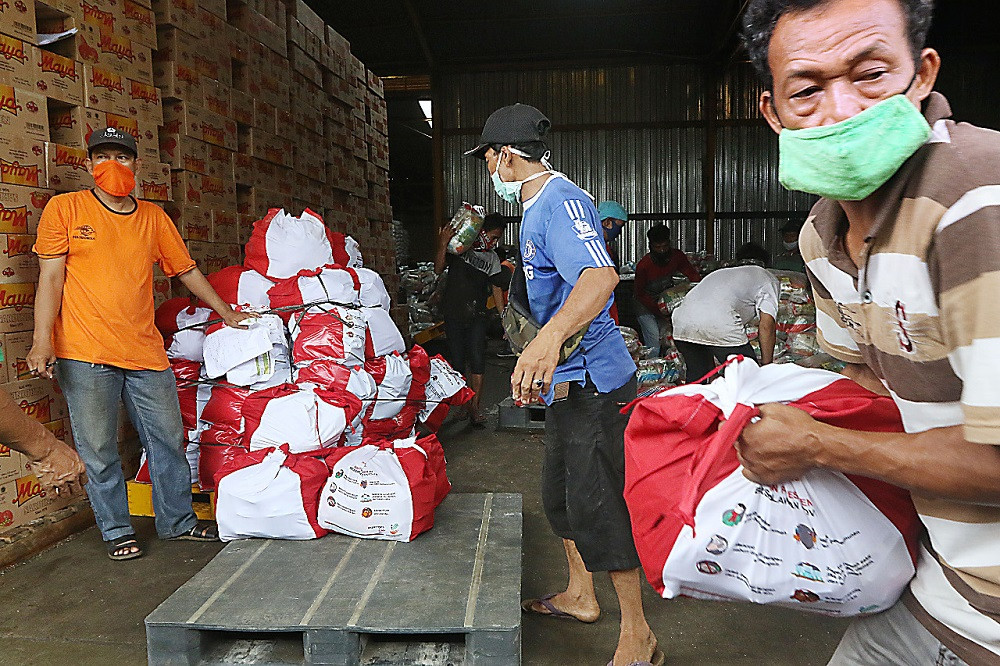Popular Reads
Top Results
Can't find what you're looking for?
View all search resultsPopular Reads
Top Results
Can't find what you're looking for?
View all search resultsDigitize social aid to expedite COVID-19 relief, World Bank says
Change text size
Gift Premium Articles
to Anyone
T
he pandemic and its economic consequences have prompted many countries to scale up their social assistance programs through a strong, digitized government-to-person payment system, a World Bank official has said.
“Countries that have advanced G2P [government-to-person] payment systems have been able to deliver cash to vulnerable people much faster and much safer than countries that don’t have such a system,” World Bank Indonesia and Timor Leste country director Satu Kahkonen said during a recent webinar.
She cited Chile, which has used its national ID-linked bank accounts to deliver social support to about 2 million citizens during the pandemic, and Thailand, which used its national digital identification system to deliver emergency support to 15.3 million additional households during the pandemic.
She said Indonesia had been able to scale up its social aid programs such as the Family Hope Program (PKH) and the staple food card program. But she added it was important to digitize the verification and onboarding process for aid recipients and ensure that databases were interoperable between institutions to avoid overlapping beneficiaries.
“That [digitization] would basically improve response time, and over time, it would also save money for the government,” Kahkonen said.
Michael Wiegand, director for financial services for the poor at the Bill and Melinda Gates Foundation, said focusing on the digitization of social aid disbursement was key but that ensuring that such mechanisms did not exclude certain parts of society was equally important.
“We really need to make sure these systems don’t exclude people and that they allow them to get access to services they need. Being able to move these digital funds and convert them into cash is critical,” he said.
Indonesia, he added, should go beyond traditional financial services so that its social aid beneficiaries could access aid easily. He said the country’s thriving fintech industry could be leveraged to deliver aid to beneficiaries.
As more institutions get involved in delivering social aid, Wiegand emphasized the need to ensure that different aid delivery systems were interoperable to allow recipients to choose methods preferable to them.
Read also: COVID-19 crisis exposes holes in social aid disbursement
National Development Planning Agency (Bappenas) deputy head of workforce and population Pungky Sumadi said the government had recently teamed up with state-owned postal company PT Pos Indonesia and had tapped into its expansive network throughout Indonesia to deliver social aid to far-flung regions.
Pungky added that the government was working to identify and employ the preferred method of aid delivery for each of the recipients.
“We need to identify and acknowledge the needs of the beneficiaries. ‘OK, maybe I am more comfortable with ATMs, but maybe others will be more comfortable with pawnshops because they’re just next door’, things like that,” Pungky said, adding that the process would demand additional human resources.
The government aims to use its national ID database – which according to Pungky covers about 98 percent of the total population – to enhance the identification and targeting of aid recipients.
The government has allocated Rp 203.9 trillion (US$13.91 billion) for social safety net programs to support economically vulnerable groups during the pandemic. That figure includes Rp 37.4 trillion for the PKH program and Rp 46.3 trillion for the staple food card program.
The government has previously received criticism for delays in the disbursement of aid to eligible recipients of the PKH and staple food card programs, which largely resulted from a lack of reliable data.
A study conducted by the SMERU Research Institute in five cities and regencies from late April to mid-May also found indications that the aid disbursement had been mistargeted.
Read also: Data fiasco causes delays in disbursement of social assistance: Study
Andi ZA Dulung, an expert staff member for the Social Affairs Minister, said the government was seeking to expand the social protection system, mainly by updating the ministry's Integrated Data for Social Welfare (DTKS), to make it more responsive to future crises.
“The COVID-19 pandemic is an opportunity for Indonesia to improve DTKS data. We are planning a mass verification and evaluation in 2021,” said Andi. “Hopefully […] we can get more up-to-date data that leads to better targeting of social assistance.”
He said it would be critical to improve the resilience of Indonesian families during the post-pandemic recovery.










